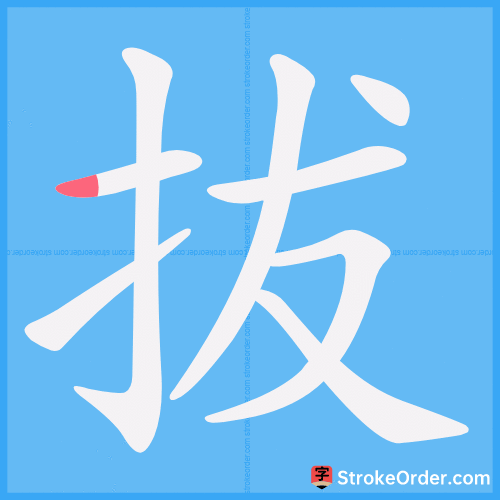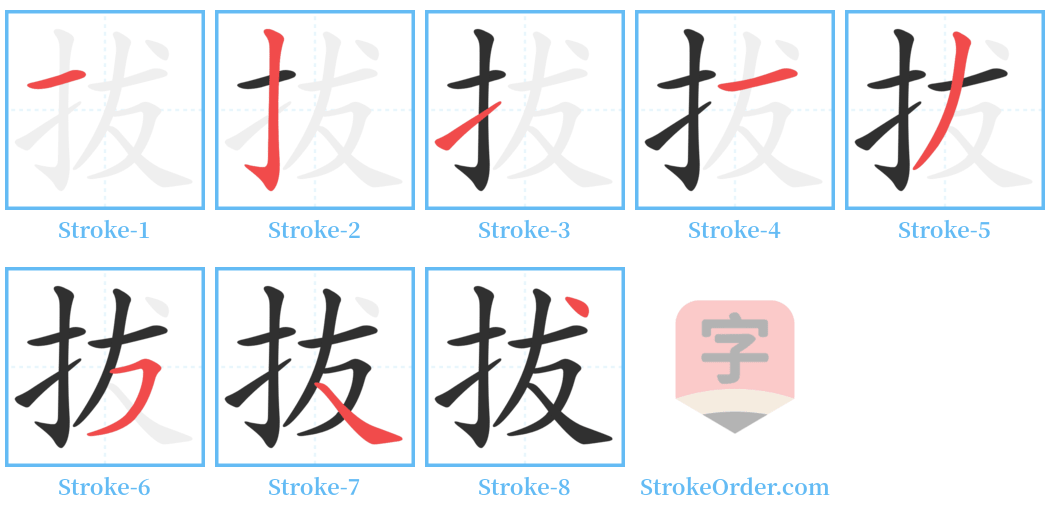拔 Stroke Order
Animated Stroke Order of 拔

Stroke Order Diagrams for 拔

Step-by-Step Handwriting Guide for 拔

Learn to Write Chinese Characters with Video Tutorials
Watch the video of writing the Chinese character "拔", learn the correct stroke order (笔顺) of the character "拔", and master the standard way of writing the character "拔".
Free Printable Handwriting Practice with Stroke Order: 拔
Printable Writing Practice Worksheet of "拔" in Portrait Orientation (Tian Zi Ge)

Printable Writing Practice Worksheet of "拔" in Landscape Orientation (Tian Zi Ge)

Information of 拔
Pinyin
bá
Radical
扌
Strokes
8 strokes
Usage
★★★★★
Definition
pull up / pull out / select / promote
拔 [bá]
1. 抽,拉出,连根拽出: To pull out; to extract.
- Example: 拔腿 (pulling out a leg); 拔草 (pulling out grass); 拔牙 (pulling out a tooth); 拔苗助长 (to pull up seedlings to help them grow).
2. 夺取军事上的据点: To seize military strongholds.
- Example: 连拔数城 (to capture several cities in succession).
3. 吸出: To draw out.
- Example: 拔毒 (to draw out poison); 拔火罐儿 (to perform cupping therapy).
4. 选取,提升: To select; to promote.
- Example: 提拔 (to promote); 拔擢 (to elevate).
5. 超出,高出: To stand out; to exceed.
- Example: 海拔 (altitude); 挺拔 (tall and straight); 拔地 (to rise high above the ground).
6. 把东西放在凉水里使变凉: To cool something down in cold water.
- Example: 把西瓜放在冰水里拔一拔 (put the watermelon in ice water to cool it).
7. 改变: To change.
- Example: 坚韧不拔 (unyielding); 心志不可拔 (one's resolve cannot be shaken).
【本义】: 拔起,拔出: The original meaning is to pull up or extract.
【造字法】: 形声。从手,犮( bó)声: The character is a phono-semantic compound, composed of the hand radical and the sound component.
1. 同本义: pull out; pull up.
2. 选拔; 提拔: promote.
3. 突出; 超出: stand out.
4. 突起: rise high.
5. 脱身; 脱离,摆脱: escape from.
6. 攻取: seize; capture.
7. 移动: move.
8. 把东西放在凉水里使它变凉: cool in water.
9. 吸出: draw out (poisons, etc.).
引例:
1. 《说文》: 拔,擢也。
2. 《苍颉篇》: 拔,引也。
3. 《易·乾》: 确乎其不可拔。 郑注: “移也。”
4. 《封氏见闻录》: 拔河。
5. 《孟子·尽心上》: 杨子取为我,拔一毛而利天下,不为也。
6. 《史记·项羽本纪》: 力拔山兮气盖世。
例句:
又如: 拔剑切而啖之 (to draw the sword and cut it); 拔剑撞而破之 (to draw the sword and break it).
又如: 拔毛; 拔草; 拔秧.
选拔; 提拔:
1. 诸葛亮《出师表》: 是以先帝简拔以遗陛下。
2. 李白《与韩荆州书》: 山涛作冀州,甄拔三十余人.
Example:
又如: 拔用 (to promote someone); 拔补 (to elevate an official position); 选拔 (to select); 提拔 (to select personnel for higher positions).
突出; 超出:
1. 唐· 李白《梦游天姥吟留别》: 势拔五岳掩赤城.
Example:
又如: 拔绝 (to be outstanding); 出类拔萃 (to stand out from the crowd).
突起:
1. 宋· 沈括《梦溪笔谈》: 皆峭拔险怪.
2. 宋· 陆游《过小孤山大孤山》: 然峭拔秀丽皆不可与小孤比.
Example:
又如: 挺拔 (erect and towering); 拔立 (soaring; standing tall).
脱身; 脱离,摆脱:
Example:
如: 拔哨 (to sneak away); 拔身 (to escape); 拔不出腿 (to have too many matters hindering one's escape).
攻取:
1. 《史记·廉颇蔺相如列传》: 拔石城.
2. 《史记·魏公子列传》: 已拔赵.
Example:
又如: 拔城; 连拔敌人四个据点 (to consecutively capture four enemy strongholds).
移动:
1. 罗贯中《三国演义》: 亮拔县千余家.
把东西放在凉水里使它变凉:
Example:
如: 把西瓜放在水里拔一拔 (put the watermelon in the water to cool it).
吸出:
Example:
如: 拔火罐 (to perform cupping therapy); 拔毒 (to draw out poison).
lit. with swords drawn and bows bent (idiom); fig. a state of mutual hostility / at daggers drawn
Input Method for 拔
Pinyin
ba2
Wubi
rdcy
Cangjie
qike
Zhengma
dgxs
Four Corner
53047
Unicode
U+62d4
Same Pronunciation Characters